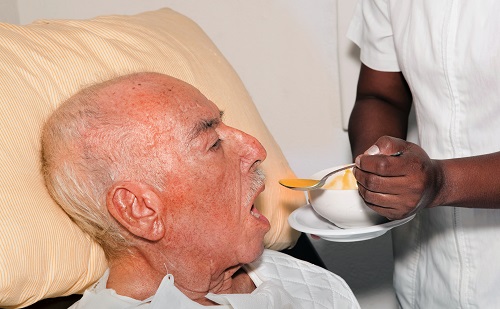5 Tips to Prevent Malnutrition While on Dialysis

For people with end stage kidney disease (ESKD) on dialysis, you have probably heard your dietitian ask you over and over again, “How are you eating?” or, “How is your appetite?” Your dietitian might ask to look at your temples or under your eyes, touch your triceps, or ask to exam other parts of the body. In addition, dietitians might look for signs of body swelling, review weight history or test hand strength. These nutrition questions and exams are part of what is called a nutrition-focused physical exam, which helps the dietitian assess for malnutrition.
What is malnutrition?
There are many different types of malnutrition. When you think of malnutrition, you might first think of not enough nutrition or undernutrition. However, malnutrition can also occur with people that have too much nutrition. Overnutrition can cause obesity, other health diseases or a lack of the proper nutrients the body needs.1 According to the Academy of Nutrition and Dietetics, malnutrition is nutrition that is not balanced and it can mean too little or too much nutrition.2
Top 5 Tips to Prevent Malnutrition
People on dialysis are at high risk for malnutrition due to the fact that other health issues are usually present. Preventing malnutrition is key and leads to better health outcomes and quality of life. Below are my five best tips for preventing malnutrition while on dialysis.
- For those people with a decreased appetite, try to eat smaller meals throughout the day. Eat slowly and leave drinks until the end of meals to avoid getting full from the liquids. Also, if you just don’t know what to eat, check out DaVita.com for kidney-friendly recipe ideas.
- Oral nutrition supplements are a great way to get some extra calories and protein. Protein shakes, liquid protein and protein bars are great options. Nutrition supplements are best used in between or at the end of meals. Remember to talk to your dietitian before starting a supplement.
- Dialysis does remove some vitamins and minerals from the blood. Ask your dietitian or doctor about whether starting a renal vitamin is right for you.
- For those concerned with overeating or excessive weight, work with your dietitian to create a healthy eating plan and achieve a healthy weight. For dialysis patients, it is recommended to eat 5 servings of low-potassium fruits and vegetables a day. It would be wise to fill up on the low-potassium fruits and vegetables alongside a large-portion protein and a healthy serving of kidney-friendly grains.
- It is highly encouraged that people on dialysis not miss dialysis treatments and run their prescribed treatment time. This will ensure that all the toxins and fluid are removed from the blood. It will also help you feel your best and prevent fluid overload that might lead to a hospitalization.
For more information on malnutrition, check out the following Kidney Diet Tips articles.
References:
- Academy of Nutrition and Dietetics.Eatright.org. https://www.eatright.org/food/nutrition/healthy-eating/how-an-rdn-can-help-with-malnutritionhttps://www.eatright.org/food/nutrition/healthy-eating/how-an-rdn-can-help-with-malnutrition. Published 2020. Accessed January, 12, 2021.
- Academy of Nutrition and Dietetics.Eatright.org. https://www.eatright.org/food/nutrition/healthy-eating/what-is-malnutritionhttps://www.eatright.org/food/nutrition/healthy-eating/what-is-malnutrition. Published 2020. Accessed January, 12, 2021.
Additional Kidney Diet Resources
Visit DaVita.com and explore these diet and nutrition resources:
- DaVita Food Analyzer
- DaVita Dining Out Guides
- Today’s Kidney Diet Cookbooks
- DaVita Kidney-Friendly Recipes
- Diet and Nutrition Articles
- Diet and Nutrition Videos
- Kidney Smart® Virtual Classes
This article is for informational purposes only and is not a substitute for medical advice or treatment. Consult your physician and dietitian regarding your specific diagnosis, treatment, diet and health questions.

Recent Comments